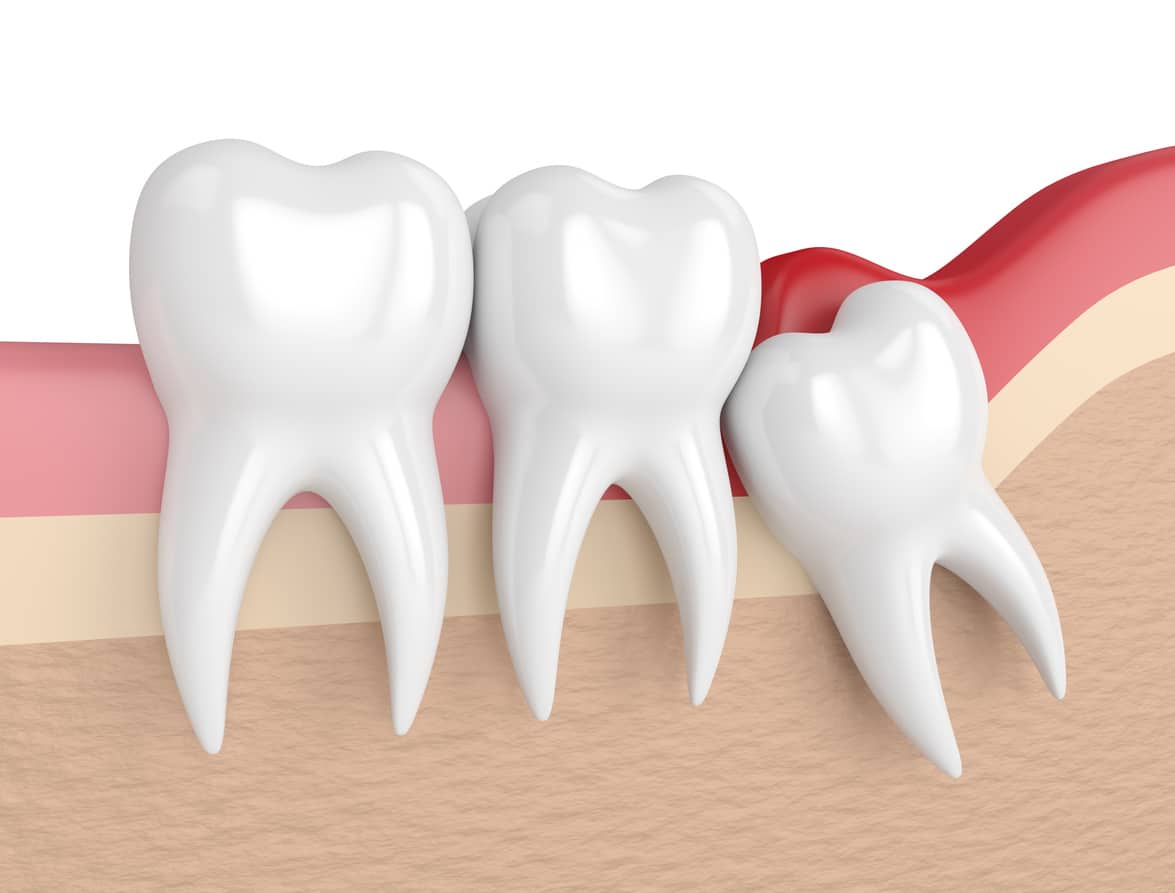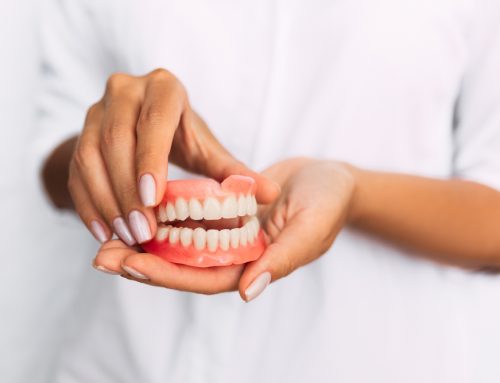It’s normal to have sensitive teeth after wisdom tooth extraction. In fact, your entire jaw is most likely going to feel sore and swollen from the surgery. Your gums will also be sore for a few days.
Reasons for wisdom tooth extraction
While wisdom teeth don’t always need to be removed so long as they are positioned properly in the mouth and are not causing pain, there are some common reasons people choose to have their wisdom teeth extracted. Impacted teeth and crowding of teeth within the mouth is the most common cause for wisdom tooth extraction. This can be associated with or without pain, depending upon the pressure on the molars and other teeth as the wisdom teeth come in.
Impacted Tooth: If there is a tooth in the way of the wisdom tooth while it’s growing into place, the tooth will become impacted, and then either grow at an angle or erupt only partially. Without space to properly clean between the teeth, both of these options can provide excellent opportunities for plaque to spread. If the impacted teeth collide with roots of your molars, it can be quite painful as the molar and the wisdom tooth grind and rub on each other, wearing them down, and causing worse dental issues.
Pericoronitis: The inflammation of the gums and surrounding area of the wisdom tooth – almost always in the bottom teeth – when it’s erupting can cause great pain followed by a bad taste in the mouth.

In order to decide whether your child’s wisdom teeth will need to be removed, visit our dentist office in Keller, TX for a dental exam. If you decide not to remove the wisdom tooth, be sure to floss and use mouthwash every day in order to prevent plaque, gingivitis, and other dental issues.
What if my wisdom teeth grow in and don’t hurt?
So long as there is minimal to no crowding of the teeth once the wisdom teeth are fully grown, it may be safe to leave them be. However, we usually recommend that wisdom teeth are removed in order to prevent other potential problems such as cavities. Even if there is a small amount of space between your 2nd molars and your wisdom teeth, they are quite far back and have a higher risk of needing fillings.
- Swelling around the surgical tooth extraction. Swelling is typically at its worst during the 2nd or 3rd day after wisdom tooth surgery.
- Stiffness and soreness in the jaw is extremely common as well as having trouble opening the mouth to speak or eat.
- Referred pain noticeably in the surrounding teeth is common and temporary. If it lasts for more than two weeks give us a call.
- During surgery, the corners of the mouth may be stretched in order to reach the targeted wisdom teeth. Many people notice cracking and soreness in their lips from being stretched.
- There’s an empty space! Yes, the tooth is gone and there’s a gap while the tissue fills in over time. The younger you are, the faster the gap fills generally.
- You might feel a little feverish for 1 to 2 days.
- Some people have more sensitive skin and experience bruising.
If you notice any of these symptoms, you shouldn’t have anything to worry about. If there’s anything that bothers you or that you’re unsure of, please contact our dental office to ask us any questions you may have.
Common Complaints After Wisdom Teeth Extraction
The removal of impacted wisdom teeth is quite different than with extracting other erupted and can come with discomfort or other possibly alarming symptoms. In order to provide the best information possible, we’re going to list the most common complaints we hear after we extract a wisdom tooth as well as whether they should be of concern or worry-free.
Pain in other teeth after wisdom teeth extraction
Some patients whose wisdom teeth were severely impacted and causing pressure on their other teeth notice a change in their bite as if their teeth were shifting. This is even more common among patients that have all four wisdom teeth removed at the same time.
If you notice pain or shifting from your other teeth and this scenario matches yours, you most likely just need to wait for the inflammation to go down and your teeth and gums to adjust from having your wisdom teeth removed. If this pain persists, give our dental office a call to check to make sure there are no additional issues.
Preventing and treating wisdom tooth symptoms
The best way to prevent wisdom tooth symptoms of pain and damage to all of your teeth is to see the dentist. There are many home remedies that people recommend for pain such as ibuprofen, or mouthwash with chlorhexidine, the only true way to safely secure the health and longevity of your mouth is to contact your dentist for an exam and consultation.
When should I get my wisdom teeth removed?
There is not specific age for wisdom tooth removal. Everyone is affected by their wisdom teeth differently and may or may not need them removed. Many choose to have their wisdom teeth removed when they are teenagers or young adults, but others may still have their wisdom teeth all the way into adulthood. If you’ve managed to keep your wisdom teeth into your 30’s or later without oral complications, then you most likely don’t need them removed.
Tooth extraction cost
Wisdom teeth removal costs can vary depending on how many need to be removed, upper vs. lower, the state of the gums around the teeth, how much they have erupted, whether they have impacted or aren’t visible yet, as well as what type of anesthesia is used.
To get an accurate quote on the cost of your’s or your child’s wisdom teeth extraction, schedule an appointment with Dr. Pickett in Keller, TX by giving us a call at (817) 431-5514.
How wisdom teeth are removed
There are usually 3 steps to properly extract wisdom teeth, although depending on the circumstances there may be others added to the process.
- Local anesthetic is given: Sedation by laughing gas or general sedation is given to help with discomfort and anxiety.
- The gum around the tooth is removed and the socket expanded until the root’s ligament is weak enough to allow the tooth to be removed.
- Once the tooth is removed, the socket is cleaned, edges around the tooth smoothed, and then stitched if necessary.
Wisdom teeth removal aftercare
Aftercare for your sensitive teeth after wisdom tooth extraction requires diligence. Keeping the gauze clean and replaced regularly while rinsing with saline helps prevent infection. It’s also a good idea to stick to soft foods such as pudding, smoothies, yogurt, and protein shakes. For a more in-depth list of foods to eat after our wisdom teeth removal check out this list of 15 soft foods.
Be sure to take excellent care to follow all the instructions given to you by your local Keller dentist. Schedule your wisdom teeth appointment with Dr. Pickett by calling Pickett Family Dental at (817) 431-5514.



